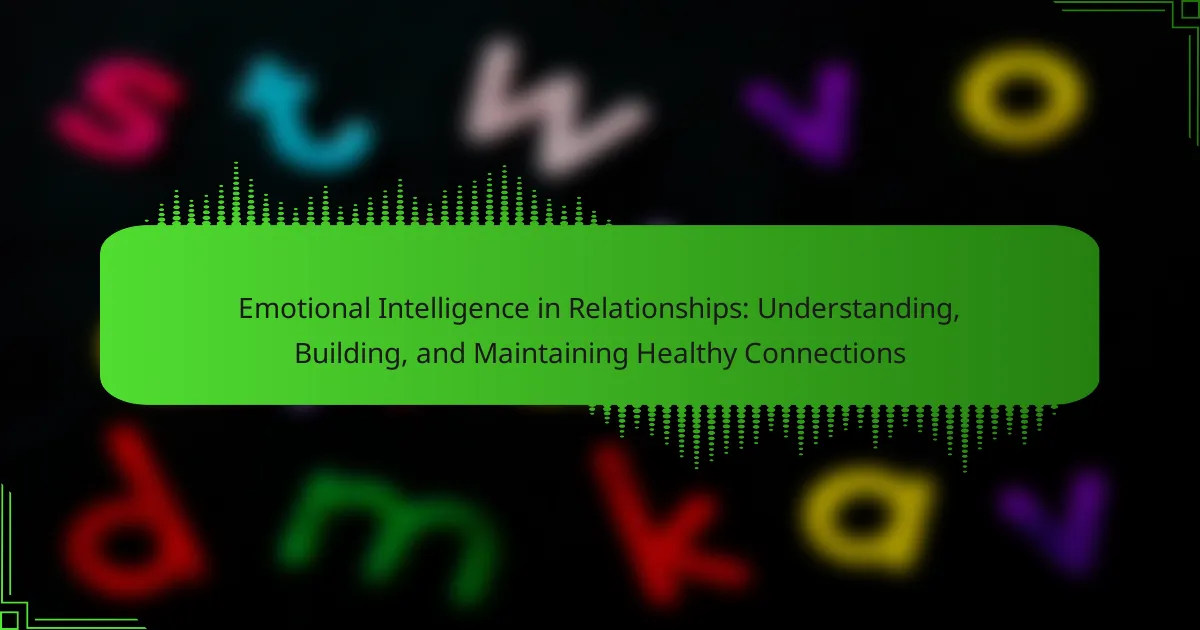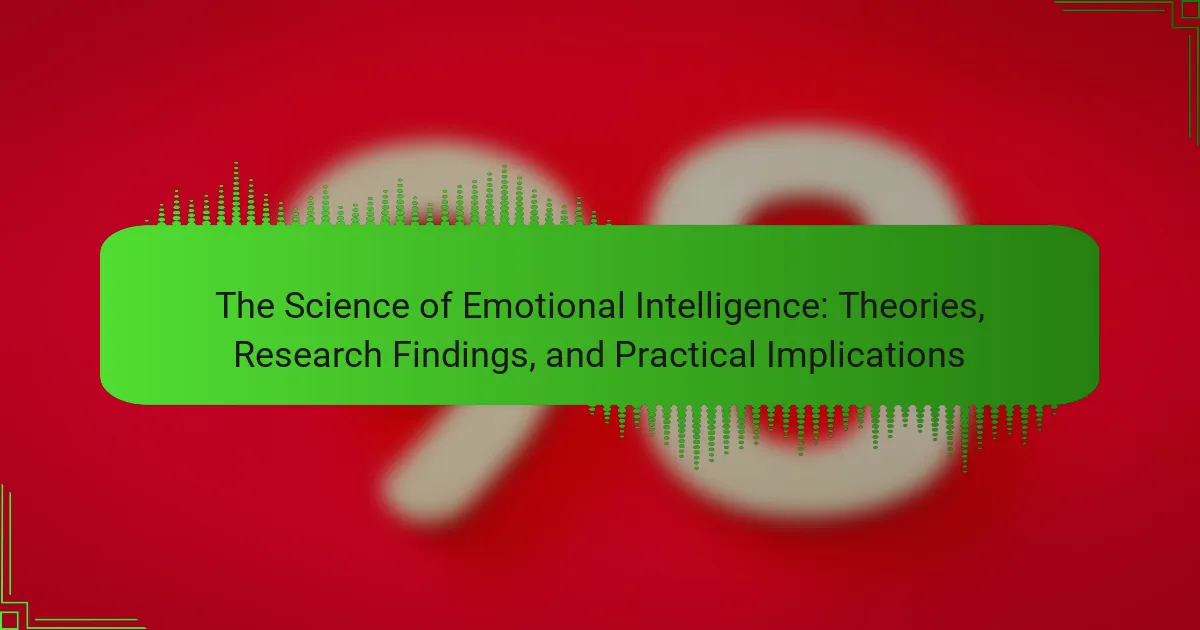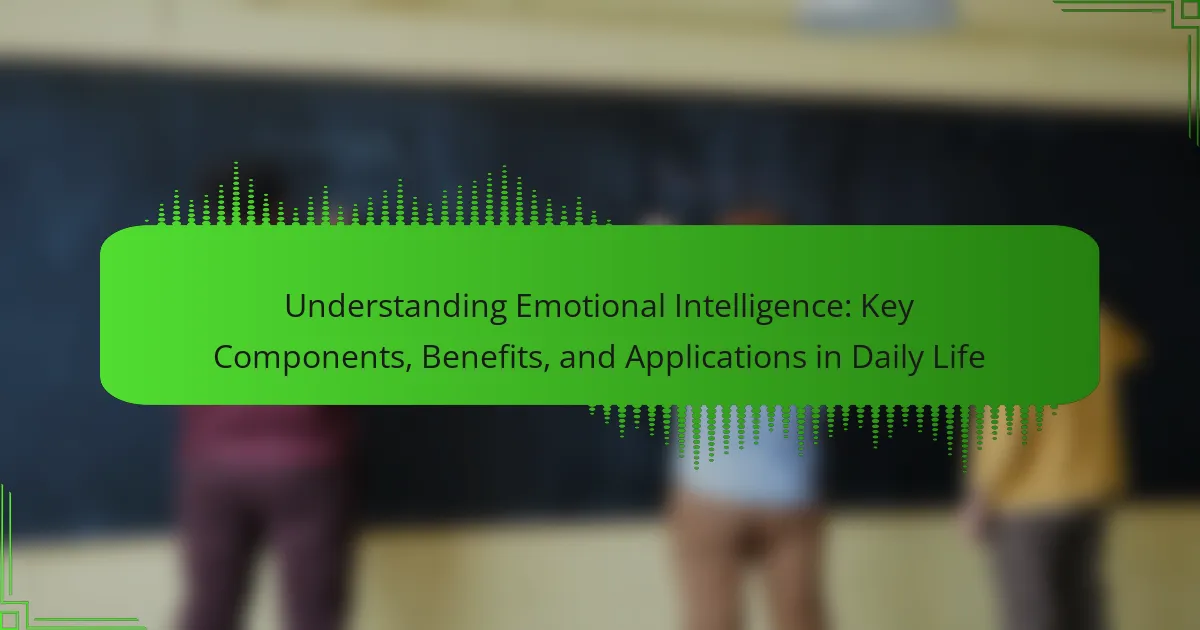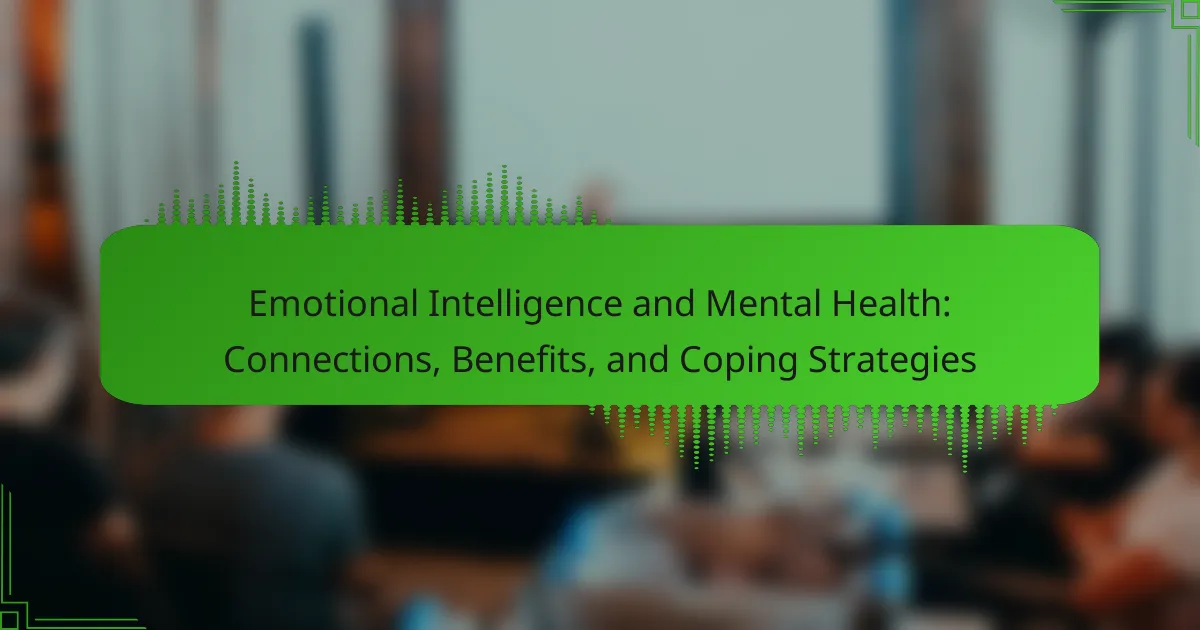Emotional intelligence in relationships is the ability to recognize, understand, and manage emotions, significantly influencing interpersonal interactions. This skill fosters empathy, enhances conflict resolution, and contributes to relationship satisfaction by promoting open communication and emotional regulation. Key strategies for developing emotional intelligence include active listening, empathy, and engaging in open dialogue, which strengthen emotional bonds. Additionally, conflict resolution training and regular communication can maintain emotional intelligence in long-term relationships. Practicing gratitude and seeking professional support further enhance relationship quality, ensuring healthier connections over time.
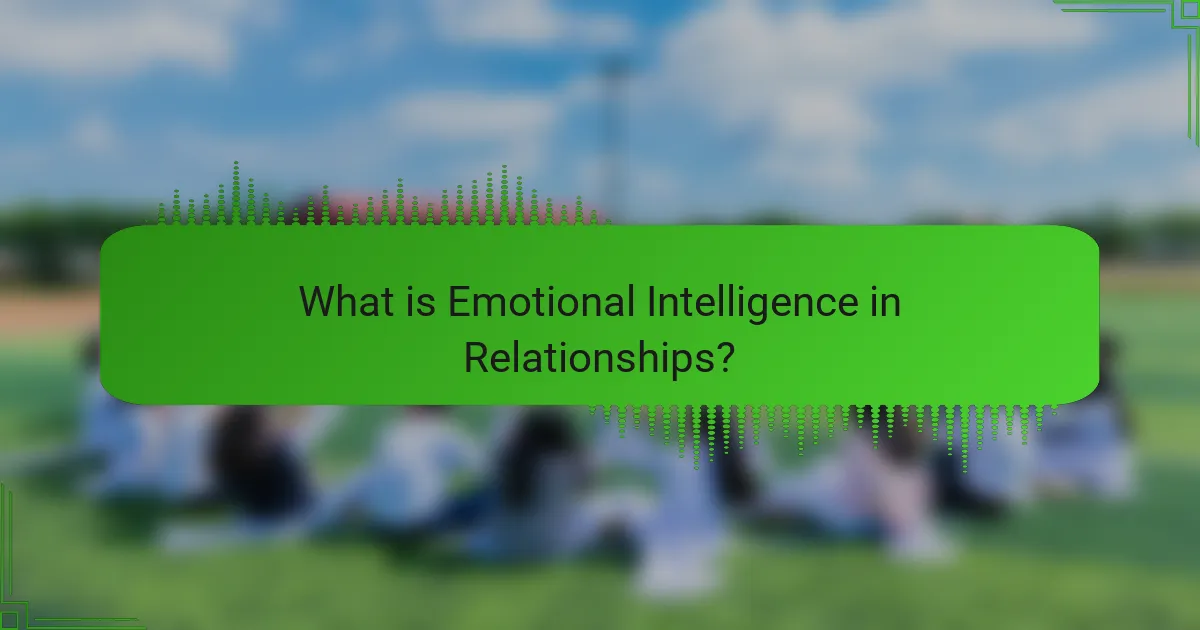
What is Emotional Intelligence in Relationships?
Emotional intelligence in relationships refers to the ability to recognize, understand, and manage emotions effectively. It plays a crucial role in how individuals interact with one another. High emotional intelligence fosters empathy, enabling partners to connect deeply. It also aids in conflict resolution by promoting open communication. Studies show that couples with high emotional intelligence report greater relationship satisfaction. Furthermore, emotional intelligence contributes to emotional regulation, allowing individuals to respond thoughtfully rather than react impulsively. This skill set enhances trust and intimacy, forming a strong foundation for healthy connections.
How does emotional intelligence influence relationship dynamics?
Emotional intelligence significantly influences relationship dynamics by enhancing communication and understanding. Individuals with high emotional intelligence can recognize and interpret their own emotions and those of others. This ability fosters empathy, allowing for deeper connections. Effective emotional regulation leads to healthier conflict resolution. Research shows that couples with higher emotional intelligence report greater satisfaction. They navigate challenges more effectively, maintaining harmony. This correlation highlights the importance of emotional intelligence in forming and sustaining positive relationships.
What are the key components of emotional intelligence?
The key components of emotional intelligence are self-awareness, self-regulation, motivation, empathy, and social skills. Self-awareness involves recognizing one’s emotions and their impact on thoughts and behavior. Self-regulation refers to managing emotions and impulses effectively. Motivation is the drive to pursue goals with energy and persistence. Empathy is the ability to understand and share the feelings of others. Social skills encompass the ability to build and maintain relationships, communicate effectively, and resolve conflicts. These components collectively enhance interpersonal relationships and communication.
How do these components manifest in personal interactions?
Emotional intelligence components manifest in personal interactions through empathy, self-awareness, and effective communication. Empathy allows individuals to understand and share the feelings of others. This leads to deeper connections and trust in relationships. Self-awareness helps individuals recognize their own emotions and how they affect interactions. This recognition fosters better responses to others’ feelings. Effective communication involves expressing thoughts and emotions clearly. This clarity prevents misunderstandings and promotes healthy dialogue. Studies show that high emotional intelligence correlates with stronger relationship satisfaction. For instance, research by Brackett et al. (2011) indicates that emotional intelligence enhances conflict resolution skills.
Why is emotional intelligence important for healthy relationships?
Emotional intelligence is important for healthy relationships because it enhances communication and understanding. Individuals with high emotional intelligence can recognize and manage their own emotions. They can also empathize with others’ feelings. This leads to more effective conflict resolution. Research shows that couples with high emotional intelligence report greater relationship satisfaction. A study published in the Journal of Marriage and Family found that emotional intelligence contributes to better relationship quality. It allows partners to express their needs and feelings constructively. Emotional intelligence fosters trust and intimacy, which are essential for lasting connections.
How does emotional intelligence contribute to effective communication?
Emotional intelligence enhances effective communication by enabling individuals to understand and manage their emotions and the emotions of others. This understanding fosters empathy, which is crucial for connecting with others. Empathy allows individuals to interpret nonverbal cues accurately. It also helps in responding appropriately to emotional expressions. Moreover, high emotional intelligence aids in conflict resolution by promoting calm and constructive dialogue. Research shows that teams with emotionally intelligent members communicate more openly. This leads to improved collaboration and reduced misunderstandings. Effective communication is essential for building and maintaining healthy relationships.
What role does emotional intelligence play in conflict resolution?
Emotional intelligence plays a crucial role in conflict resolution. It enables individuals to recognize and understand their own emotions and those of others. This awareness fosters empathy, which is essential for effective communication during conflicts. People with high emotional intelligence can manage their emotions, reducing escalation during disagreements. They are also adept at identifying underlying issues, leading to more constructive discussions. Research shows that teams with emotionally intelligent members resolve conflicts more efficiently. Emotional intelligence contributes to finding mutually beneficial solutions, improving relationships in the process.
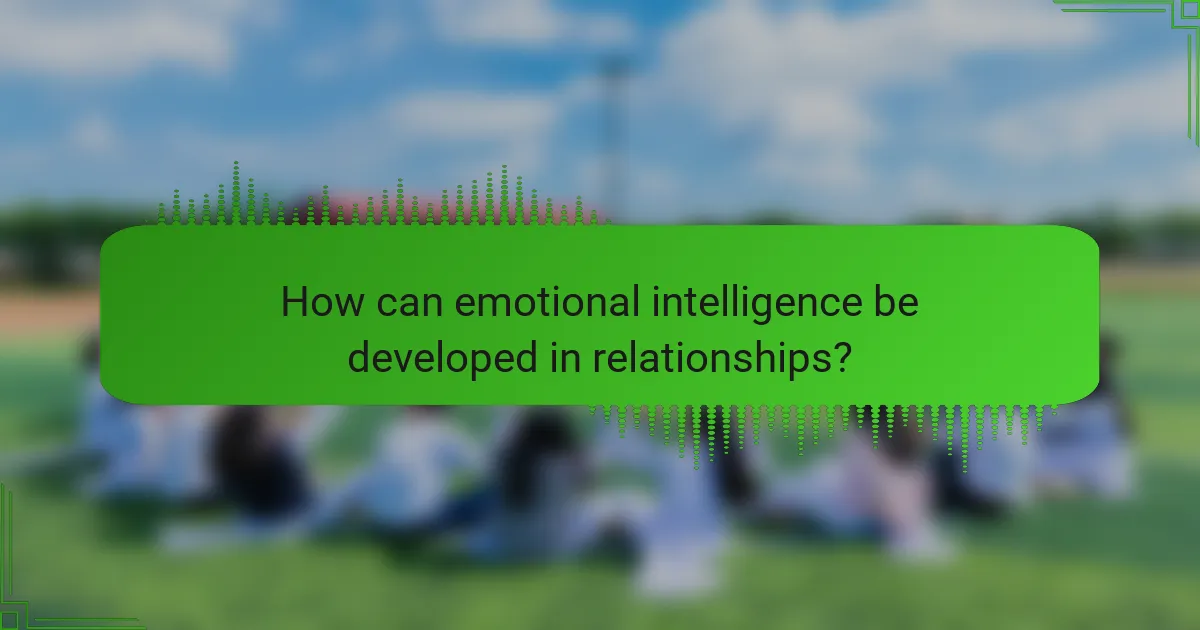
How can emotional intelligence be developed in relationships?
Emotional intelligence can be developed in relationships through active listening and empathy. Active listening involves fully concentrating on the speaker, understanding their message, and responding thoughtfully. This practice fosters deeper connections and enhances mutual understanding. Empathy allows individuals to recognize and validate the emotions of others. It helps in responding appropriately to their feelings.
Engaging in open communication is another vital approach. Sharing feelings and thoughts promotes transparency and trust. Regularly discussing emotional experiences can strengthen emotional bonds. Additionally, practicing self-awareness is crucial. Recognizing one’s emotions aids in better emotional regulation in interactions.
Participating in conflict resolution training can also enhance emotional intelligence. Such training teaches effective strategies for managing disagreements constructively. Research indicates that emotionally intelligent individuals tend to have healthier relationships. They can navigate conflicts with greater ease and maintain positive interactions.
What strategies can be used to enhance emotional intelligence?
Strategies to enhance emotional intelligence include practicing self-awareness, improving empathy, and developing emotional regulation skills. Self-awareness involves recognizing one’s own emotions and their impact on thoughts and behavior. This can be achieved through mindfulness practices such as meditation. Empathy can be improved by actively listening to others and trying to understand their perspectives. Engaging in conversations that explore feelings can enhance this skill. Emotional regulation skills involve learning to manage and respond to emotions appropriately. Techniques such as cognitive restructuring can be applied to change negative thought patterns. Research indicates that these strategies contribute to better interpersonal relationships and improved communication.
How can self-awareness improve emotional intelligence?
Self-awareness enhances emotional intelligence by enabling individuals to recognize their own emotions. This recognition allows for better regulation of feelings in various situations. Understanding personal emotional triggers can lead to improved responses to others’ emotions. Research indicates that self-aware individuals exhibit higher empathy levels. They can interpret social cues more accurately. This accuracy fosters stronger interpersonal relationships. Studies show that emotionally intelligent people are more effective in communication. Enhancing self-awareness thus directly contributes to emotional intelligence growth.
What practices foster empathy in relationships?
Active listening fosters empathy in relationships. This practice involves fully concentrating on the speaker without interrupting. It shows respect and validates their feelings. Reflective responses further enhance this connection. By summarizing what the speaker said, it demonstrates understanding. Nonverbal cues, such as maintaining eye contact, also play a crucial role. They convey attentiveness and concern. Sharing personal experiences can create a sense of shared understanding. This builds trust and deepens emotional bonds. Engaging in open dialogue encourages vulnerability, which is essential for empathy. Research indicates that these practices significantly improve relational satisfaction and emotional closeness.
What are the challenges in building emotional intelligence?
Building emotional intelligence presents several challenges. One significant challenge is self-awareness. Many individuals struggle to recognize their own emotions and how they affect their behavior. This lack of awareness can hinder personal growth and the ability to empathize with others.
Another challenge is emotional regulation. Managing one’s emotions in stressful situations requires practice and discipline. Individuals often react impulsively rather than thoughtfully, which can damage relationships.
Social skills also pose a challenge. Effective communication and conflict resolution are vital for developing emotional intelligence. Many people find it difficult to express their feelings or to understand the emotions of others.
Motivation is another barrier. Building emotional intelligence requires a commitment to personal development. Some individuals may lack the drive to improve their emotional skills.
Lastly, cultural factors can impact emotional intelligence. Different cultures have varying norms regarding emotional expression. This can create misunderstandings and hinder the development of emotional intelligence in diverse settings.
How can individuals overcome barriers to emotional intelligence?
Individuals can overcome barriers to emotional intelligence through self-awareness and practice. Developing self-awareness involves recognizing one’s emotions and understanding their impact on behavior. Engaging in reflective practices, such as journaling, can enhance this awareness. Additionally, individuals should seek feedback from trusted peers to gain perspective on their emotional responses.
Practicing empathy is crucial. Actively listening to others fosters understanding and strengthens emotional connections. Mindfulness techniques can also improve emotional regulation. Research indicates that mindfulness reduces emotional reactivity, allowing for better responses in challenging situations.
Furthermore, education on emotional intelligence can provide valuable insights. Workshops and training programs effectively enhance skills related to emotional awareness, regulation, and empathy. Studies show that organizations that invest in emotional intelligence training see improved interpersonal relationships and teamwork.
By combining self-awareness, empathy, mindfulness, and education, individuals can effectively overcome barriers to emotional intelligence.
What common misconceptions exist about emotional intelligence?
One common misconception about emotional intelligence is that it is solely about being nice or agreeable. Emotional intelligence involves understanding and managing one’s emotions and the emotions of others. Another misconception is that emotional intelligence cannot be developed. Research shows that emotional intelligence can be improved through training and practice. Additionally, some believe that emotional intelligence is only relevant in personal relationships. However, it plays a crucial role in professional settings as well. Lastly, many think emotional intelligence equals empathy. While empathy is a component, emotional intelligence encompasses a broader range of skills, including self-regulation and social skills.
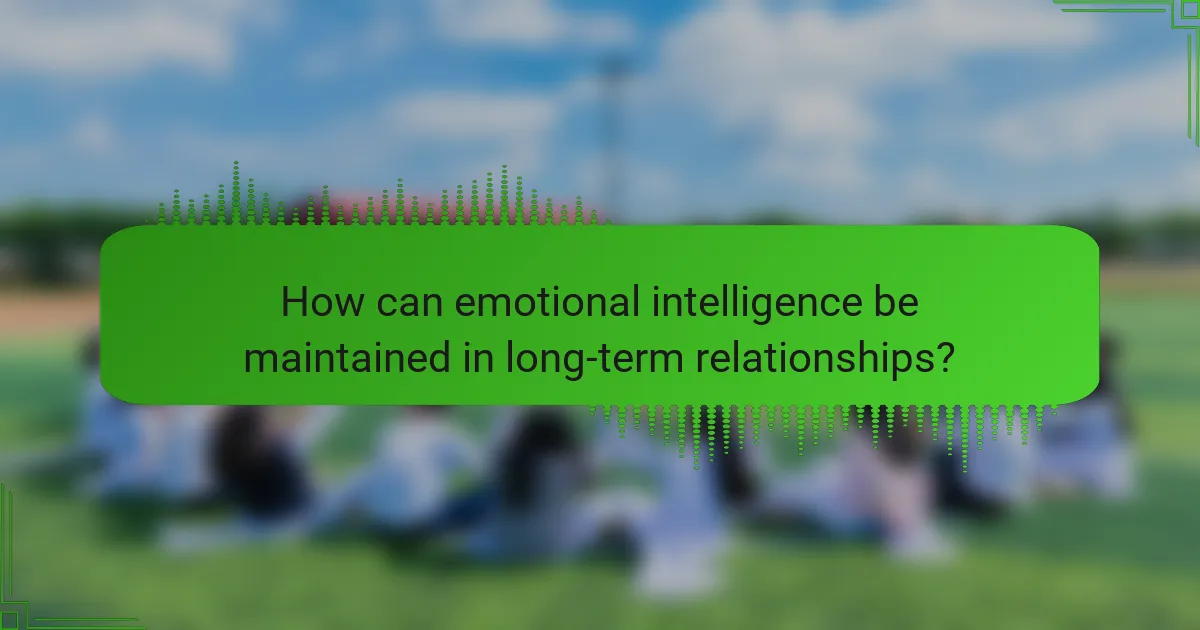
How can emotional intelligence be maintained in long-term relationships?
Emotional intelligence can be maintained in long-term relationships through regular communication and active listening. Open dialogue fosters understanding and empathy between partners. Practicing self-awareness helps individuals recognize their emotions and reactions. This awareness allows for better emotional regulation during conflicts. Engaging in shared activities strengthens emotional connections. Couples who participate in meaningful experiences together often report higher relationship satisfaction. Additionally, expressing appreciation and gratitude enhances emotional bonds. Research indicates that gratitude can significantly improve relationship quality. Lastly, seeking professional support, such as couples therapy, can help navigate challenges and build emotional intelligence over time.
What are effective ways to sustain emotional intelligence over time?
Regular self-reflection is an effective way to sustain emotional intelligence over time. This practice helps individuals assess their emotional responses and improve self-awareness. Engaging in mindfulness exercises also enhances emotional regulation. Mindfulness allows individuals to observe their thoughts and feelings without judgment. Seeking feedback from trusted peers fosters growth in emotional intelligence. Constructive criticism can highlight blind spots in emotional awareness. Additionally, continuous learning through workshops or reading on emotional intelligence keeps knowledge fresh. Research indicates that emotional intelligence can be developed through intentional practice. Therefore, these methods collectively contribute to the long-term sustainability of emotional intelligence.
How can regular communication enhance emotional intelligence?
Regular communication enhances emotional intelligence by fostering self-awareness and empathy. Engaging in consistent dialogue helps individuals recognize their own emotions and those of others. This practice allows for better understanding of emotional cues and responses. Research indicates that open communication improves conflict resolution skills. It also promotes active listening, which is crucial for emotional connection. A study by Goleman (1995) highlights that effective communication is a key component of emotional intelligence. Through regular interaction, individuals can practice and refine their emotional regulation abilities. This ultimately leads to healthier relationships and improved emotional well-being.
What role does feedback play in maintaining emotional intelligence?
Feedback is crucial for maintaining emotional intelligence. It helps individuals recognize their emotional responses and understand how they affect others. Constructive feedback allows for self-reflection and promotes personal growth. It provides insights into one’s behavior and emotional impact in relationships. Research shows that individuals who actively seek feedback exhibit higher emotional intelligence levels. Regular feedback fosters better communication and empathy. This creates stronger connections in relationships. Additionally, feedback encourages adaptability, allowing individuals to adjust their emotional responses as needed.
What are the signs of high emotional intelligence in relationships?
High emotional intelligence in relationships is indicated by several key signs. Individuals show empathy, understanding others’ feelings and perspectives. They communicate effectively, expressing their thoughts and emotions clearly. They manage their emotions well, remaining calm in stressful situations. They demonstrate active listening, fully engaging with their partner’s concerns. They resolve conflicts constructively, focusing on solutions rather than blame. They are self-aware, recognizing their own emotional triggers and responses. They express appreciation, acknowledging their partner’s efforts and contributions. These signs collectively reflect a strong foundation for healthy and nurturing relationships.
How can emotional intelligence impact relationship satisfaction?
Emotional intelligence significantly impacts relationship satisfaction. Individuals with high emotional intelligence can better understand and manage their emotions. This ability fosters effective communication and conflict resolution. Research indicates that couples with higher emotional intelligence report greater relationship satisfaction. A study published in the Journal of Marriage and Family found that emotional intelligence correlates with relationship quality. Understanding emotions helps partners empathize with each other. This empathy strengthens emotional bonds and promotes intimacy. Ultimately, emotional intelligence contributes to healthier, more satisfying relationships.
What behaviors indicate a lack of emotional intelligence?
Behaviors that indicate a lack of emotional intelligence include difficulty in recognizing emotions in oneself and others. Individuals may struggle to empathize with others’ feelings. They often respond to situations without considering emotional impact. Poor communication skills are also common. This includes an inability to express feelings clearly. Additionally, they may frequently engage in conflict without seeking resolution. Impulsive reactions to emotional situations are typical. Lastly, they might show insensitivity to social cues. These behaviors collectively demonstrate a deficit in emotional intelligence.
What practical tips can enhance emotional intelligence in relationships?
Practicing active listening can enhance emotional intelligence in relationships. This involves fully concentrating on what the other person is saying. It shows that you value their thoughts and feelings. Additionally, expressing empathy is crucial. Acknowledging and validating the emotions of others fosters deeper connections.
Another tip is to manage your own emotions effectively. Recognizing your emotional triggers helps in responding thoughtfully rather than reactively. Furthermore, maintaining open communication is vital. Sharing feelings and thoughts openly can prevent misunderstandings.
Regular self-reflection also contributes to emotional intelligence. Evaluating your responses in interactions can lead to personal growth. Lastly, seeking feedback from trusted individuals can provide insights into your emotional behaviors. This feedback can guide improvements in your relational dynamics.
Emotional intelligence in relationships is the ability to recognize, understand, and manage emotions, significantly influencing interpersonal dynamics. This article explores the key components of emotional intelligence, such as self-awareness, empathy, and effective communication, and their role in enhancing relationship satisfaction and conflict resolution. It also addresses strategies for developing and maintaining emotional intelligence over time, including active listening, open communication, and feedback. Additionally, the article highlights common misconceptions and challenges associated with emotional intelligence, providing practical tips for fostering healthier connections in relationships.
